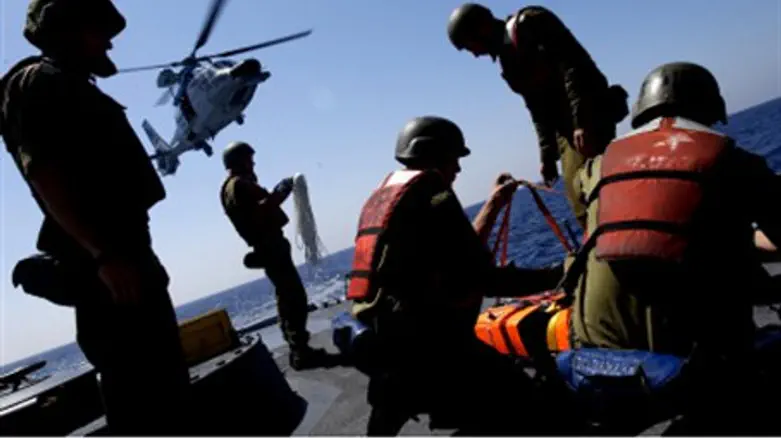
The Israeli Navy is prepared to neutralize threats targeting Israel's Tamar natural gas rig, the IDF Website reported Saturday. The Navy will protect the reception facility – a vital infrastructural facility to pump gas from the rig – which is currently being built.
The IDF's defensive model has been tested in three scenarios: routine, escalation, and emergency.
"The wisdom in the development of this kind of model is that it provides an excellent response for all three scenarios," senior naval commander Rear Adm. Yaron Levi recently explained at a conference on protecting Israel's economic waters held at the Institute for National Security Studies.
Rear Adm. Levi referred to the reception facility, which is to be completed by March 2013, and will serve as an activities base for dozens of ships, a number of helicopters, and divers' crafts. "This will be a wide-ranging operation inside a relatively small space," he said. “There hasn't been a maritime activity on this scale since the establishment of the state, and the project will continue for decades."
The major threats to Israel's exclusive economic zone on the Mediterranean are maritime terror attacks, below-surface activity, and aerial threats, he said, noting that the first stage of defense of the area is the gathering of intelligence. "Our means of discovery that are deployed on the coast and at sea will expand our discovery and image-building capabilities, and that's how we'll increase our control of our economic waters."
A Lebanese strategic analyst close to Hizbullah warned last year that the terror group will strike Israeli gas-exploration interests if Israel continues drilling in the Tamar and Leviathan gas fields.
"In case the enemy steals Lebanon's oil, Hizbullah will have the right to strike its oil installations and facilities," Feisal Abdossater told Iran's semi-official Fars News Agency.
Abdossater described Israel's drilling operations in the Mediterranean as 'aggressive and expansionist' saying they had heightened tension between Beirut and Jerusalem.
"Zionists' plot to find control over Lebanon's sea wealth has a high potential for clashes between the two sides and is likely to have dire consequences," he stated.
"The Lebanese Islamic resistance will not tolerate any kind of aggressions against the country's sovereignty," he reiterated, and added, "Hizbullah views the oil resources in Lebanon's water as a treasure for the Lebanese nation and has declared its position in this regard very transparently."
Earlier in July 2011, Hizbullah Leader Seyed Hassan Nasrallah warned Israel against trying to steal Lebanon's maritime resources, and said it would retaliate against any Israeli attack on the country's oil and gas interests.